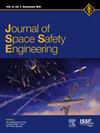Regional mechanisms to support safe, secure, and sustainable environment for space activities: A case study of Asia-Pacific region
IF 1.7
Q3 ENGINEERING, AEROSPACE
引用次数: 0
Abstract
A safe, secure, and sustainable environment for space activities is inevitable in the current space age. The fast-track development of technology and the enthusiasm to explore and exploit space resources for various benefits have also led to the development of factors that can jeopardize ongoing and future activities in outer space. On the one hand, these developments contribute to exploring new horizons of outer space but simultaneously pose significant threats to the sustainability of a conducive environment where various stakeholders can pursue their interests. Multiple initiatives have been taken at the national and international levels to address this issue; however, much more still needs to be done collectively. Since governments are the primary stakeholders and entirely responsible for space activities in terms of international law, individual efforts by governments would take longer to implement measures that can contribute to the long-term sustainability of outer space. Therefore, the role of global and regional organizations in the area has certainly become more critical. International cooperation drives the policy objectives and strategy to advance a mechanism that collectively contributes to outer space's safety and security. The regional agencies provide more significant opportunities to leverage the expertise, investments, and resources together to develop such programs. It helps to adopt multiple ways to formalize relationships that can lead to pursuing specific activities and initiatives such as joint statements, signing cooperative agreements, exchanging data, pooling financial resources, and exchanging know-how. This paper emphasizes regional cooperation schemes and identifies the possible legal tools for regional cooperation to support a safe, secure, and sustainable environment for space activities. The paper focuses on the Asia-Pacific region as a case study. It covers an analysis of the regional organizations, particularly the Asia-Pacific Space Cooperation Organization (APSCO) initiatives as the formal multilateral inter-governmental organization and the Asia-Pacific Regional Space Agency Forum (APRSAF) as a flexible and informal regional mechanism. The paper covers a comparative study of organizations on the cooperation mechanisms and policies related to space activities and their contributions to developing relevant procedures and programs to ensure outer space's sustainability.
支持安全、可靠和可持续空间活动环境的区域机制:亚太地区案例研究
在当前的空间时代,一个安全、可靠和可持续的空间活动环境是不可避免的。技术的快速发展和为各种利益探索和开发空间资源的热情也导致了各种因素的发展,这些因素可能危及正在进行和未来的外层空间活动。一方面,这些事态发展有助于探索外层空间的新领域,但同时也对各利益攸关方追求其利益的有利环境的可持续性构成重大威胁。在国家和国际两级采取了多项主动行动来处理这一问题;然而,仍有许多工作需要集体完成。由于各国政府是主要的利益攸关方,并就国际法而言对空间活动负全部责任,各国政府的个别努力将需要更长的时间来执行有助于外层空间长期可持续性的措施。因此,全球和区域组织在该地区的作用当然变得更加关键。国际合作推动政策目标和战略,推动建立共同促进外空安全的机制。区域机构提供了更重要的机会,可以共同利用专业知识、投资和资源来制定此类计划。它有助于采取多种方式使关系正规化,这些关系可能导致开展具体的活动和倡议,例如联合声明、签署合作协议、交换数据、汇集财政资源和交换专有技术。本文强调区域合作计划,并确定区域合作的可能法律工具,以支持安全、可靠和可持续的空间活动环境。本文以亚太地区为个案进行研究。报告分析了区域组织,特别是作为正式多边政府间组织的亚太空间合作组织倡议和作为灵活和非正式区域机制的亚太区域空间机构论坛。本文对与空间活动有关的合作机制和政策及其在制定相关程序和方案方面的贡献进行了比较研究,以确保外层空间的可持续性。
本文章由计算机程序翻译,如有差异,请以英文原文为准。
求助全文
约1分钟内获得全文
求助全文
来源期刊

Journal of Space Safety Engineering
Engineering-Safety, Risk, Reliability and Quality
CiteScore
2.50
自引率
0.00%
发文量
80
 求助内容:
求助内容: 应助结果提醒方式:
应助结果提醒方式:


